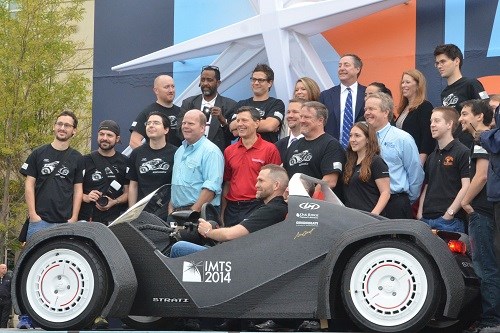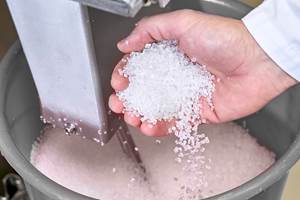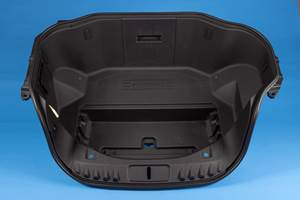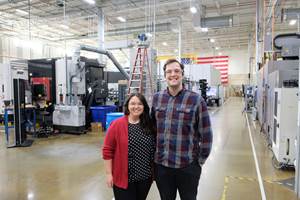Big Area Additive Manufacturing Stars at IMTS
Cincinnati Inc. is aiming to take orders for beta level and production machines next year for those who want to be first in the industry to use Big Area Additive Manufacturing (BAAM) machines.
At this year’s IMTS show in Chicago earlier this month, Cincinnati Inc., launched its prototype Big Area Additive Manufacturing Machine (BAAM), which resulted from the formation of the company’s partnership earlier this year with Oak Ridge National Laboratory (ORNL) to develop a large-scale additive manufacturing system. One that would be capable of printing polymer components up to 10 times larger than what is currently producible, and at speeds 200-500 times faster than existing machines.
The partnership’s aim is to introduce significant new capabilities to the U.S. machine tool sector which supplies manufacturing technology to automotive, aerospace, appliance, and robotic industries. The prototype machine uses the chassis and drives of Cincinnati Inc.’s gantry-style laser cutting systems at the base, and incorporates a high-speed cutting tool, pellet feed mechanism, and control software.
Cincinnati Inc.’s market development manager Rick Neff explained to me how the company participated with Local Motors, Sabic, and ORNL to take on the challenge to 3D print a car during the IMTS trade show. “We started printing on Sunday morning at 7 am. We printed the main structure of the car including the frame, seats, cockpit, hood and tail in one 1000-lb piece by 6 am on Tuesday. We then took the rough part to a Thermwood Router where the surfaces that needed to be accurately machined smooth were routed smooth.”
On Wednesday through Saturday morning, the Local Motors crew attached a drive train, suspension, steering wheel, instruments, brakes and some trim to complete the car. The car, named Strati (Italian for layers), uses a drive train from Renault that is employed in the European Twizy City Car. “Right on schedule at 9 am Saturday, we fired up the Strati and drove it out of the show…the reaction from the crowd and the press was overwhelming,” says Neff.
Here is some key information Neff provided about BAAM:
• The machine extrudes hot thermoplastic to build parts layer-by-layer, similar to an FDM machine.
• BAAM’s extrusion rates are very high—in the neighborhood of 35 lb/hr, which is reportedly hundreds of times faster than typical rapid prototyping 3D printers.
• The material for Strati is ABS with carbon fiber reinforcement formulated right into the plastic. Carbon fiber reinforced ABS is readily available for about $7/lb.
• The layer thickness is 0.160”.
• The build envelope on the prototype BAAM is 2m x 4m x 0.87m.
• The extruder can use quite a variety of thermoplastics and fiber reinforced thermoplastics. Neff says they have used ABS, PPS, PEKK, and PEI. Carbon fiber and glass fiber reinforcements have been used to improve strength and thermal stability of the parts.
Although a production version of BAAM is not yet ready for delivery, Neff confirms that the company is considering selling a very few alpha level machines to laboratories or companies who would like to do some basic research on the technology right now. He says, they are also willing to take orders for beta level and production machines that will be available in 2015 for customers who want to be the first in their industry to be using BAAM.
Related Content
Prices Up for All Volume Resins
First quarter was ending up with upward pricing, primarily due to higher feedstock costs and not supply/demand fundamentals.
Read MoreGeneral Polymers Thermoplastics to Further Expand Distribution Business
NPE2024: Following the company’s recent partnership buyout, new North American geographic territories are in its sight.
Read MoreAutomotive Awards Highlight ‘Firsts,’ Emerging Technologies
Annual SPE event recognizes sustainability as a major theme.
Read MoreScaling Up Sustainable Solutions for Fiber Reinforced Composite Materials
Oak Ridge National Laboratory's Sustainable Manufacturing Technologies Group helps industrial partners tackle the sustainability challenges presented by fiber-reinforced composite materials.
Read MoreRead Next
Beyond Prototypes: 8 Ways the Plastics Industry Is Using 3D Printing
Plastics processors are finding applications for 3D printing around the plant and across the supply chain. Here are 8 examples to look for at NPE2024.
Read MoreMaking the Circular Economy a Reality
Driven by brand owner demands and new worldwide legislation, the entire supply chain is working toward the shift to circularity, with some evidence the circular economy has already begun.
Read MoreFor PLASTICS' CEO Seaholm, NPE to Shine Light on Sustainability Successes
With advocacy, communication and sustainability as three main pillars, Seaholm leads a trade association to NPE that ‘is more active today than we have ever been.’
Read More



























